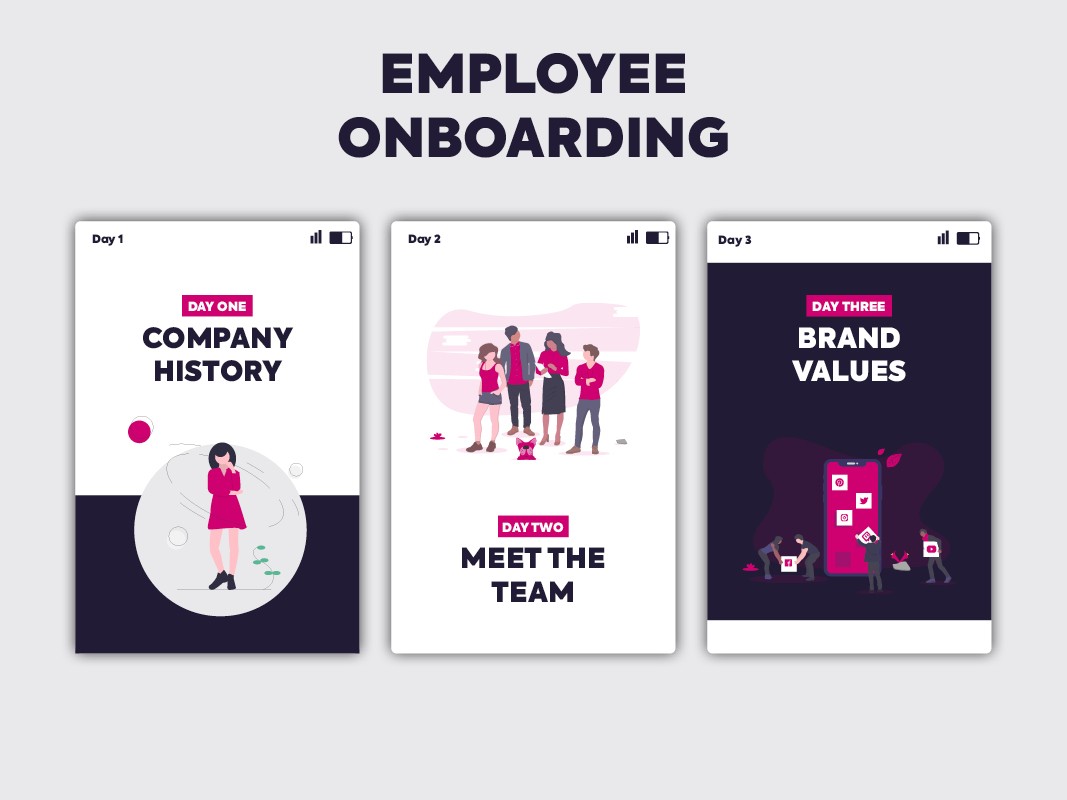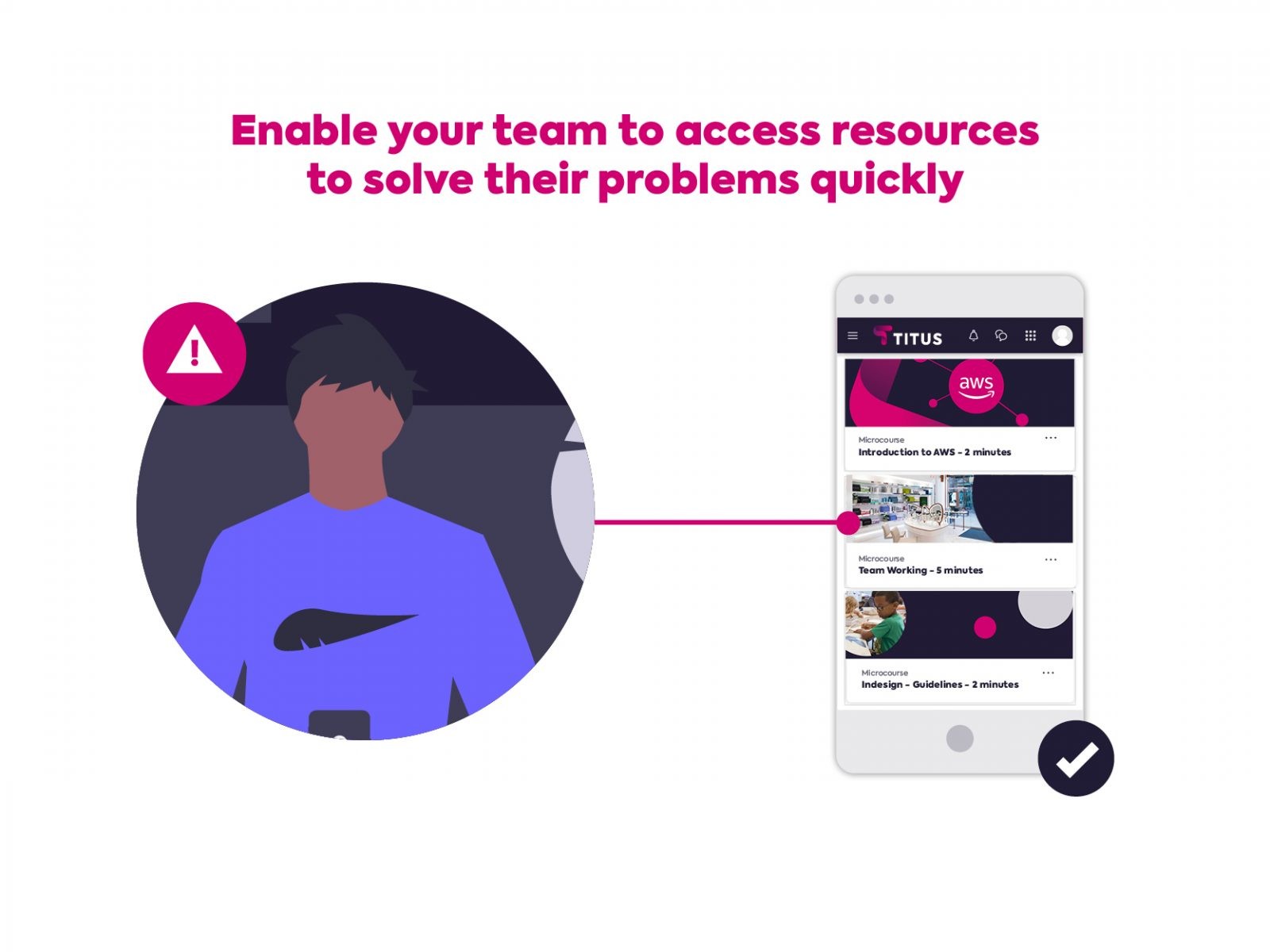- Home
- Our Solutions
Titus Services
Unlock Moodle's Potential with Titus
Migrate to Titus and transform how you use Moodle in your organisation. - Industries
- Our Work
- About
- Blog


One of the most attractive aspects of microlearning is how versatile it is. Microlearning techniques can be applied across the board, from the most formal to the most informal types of instruction. We’ve already looked at how Moodle can provide the ideal hub for microlearning activity, and we’ve offered our top tips for successful microlearning.
In this article, we’ll look at some of the practical scenarios in which this style of learning can be applied, drawing on our experience working with organizations of all shapes, sizes, and verticals around the globe.
01 Onboarding new employees

Starting a new job is probably the most learning-intensive period of most of your career. There’s a multitude of new information to digest, not only in terms of the requirements of the role, but also a new company culture, new styles of communication, and new processes, policies, and workflows to familiarise yourself with.
From an organisational perspective, there are dual priorities. L&D teams want to ensure that new starters are supplied with all the information they’ll need, and given the time and space to understand it properly before being “thrown in at the deep end”, but equally, there’s a pressure to reduce the time-to-competence as far as possible. The sooner each new recruit can reach optimal performance, the better for the customer, and the bottom line.
Using microlearning strategies can help to streamline this onboarding process, both by breaking down what can seem like an impenetrable wall of new data into manageable chunks and also by spreading out the necessary learning over the new employee’s onboarding period. Microlearning allows recruits to get started on the tasks they are confident in doing, and then access the extra training they need on-demand as their responsibilities gradually ramp up over time.
02 Managing compliance and certification
If you’re working in a highly regulated industry, then ensuring your employees maintain compliance and keep up to date with relevant certifications is a big part of workplace learning. A common problem with this type of learning can be engaging and enthusing learners – often content based on policies, regulations and laws can be viewed as dry or dull, and staying up-to-date is seen as a chore.
Microlearning can help inject some fun back into the process, breaking up long-form resources and activities into more interactive and enjoyable learning experiences. Spreading out learning in this way not only reduces fatigue but also improves retention and attainment rates.
For some purposes, microlearning alone may not be an appropriate solution. But using a blend of traditional instruction and microlearning activities can help to break up the monotony and increase completion rates. It’s worth experimenting with different formats, activity types and styles to find the perfect balance for your organisation.
03 Supporting company culture

Not all learning and development is specifically related to job roles – embedding the company culture and values is also an important part of workplace learning. Microlearning lends itself well to this type of content, as it is usually relatively informal, and not assessment based.
At Titus, we use microlearning on a regular basis to inform our team about new community initiatives, company-wide projects such as our recent rebrand, interviews with new staff members, updates on social events and as a basis to explore and discuss important topics such as Black History Month or Pride Month. It’s a great way of bringing the team together and ensuring our culture is shared and not simply applied from the management level – especially with our remote and hybrid working colleagues.
While formal assessments may not be necessary for this context, it’s a good idea to introduce some form of quiz or survey to assess how effectively learners have understood and retained the microlearning content. This provides invaluable data to inform the planning and format of future activities.
04 Just-in-time product knowledge

Product (or service) knowledge is a key area of competence for a wide range of roles. In businesses where new products are released or updated on a frequent basis, keeping employees up-to-date with features, pricing, packages and offers can be a major challenge.
Microlearning is an ideal solution to this problem, enabling organisations to create rapidly authored training content that breaks down the necessary information by individual product, allowing staff to access the facts and figures they need on a case-by-case basis.
This type of just-in-time learning reduces the need for lengthy training sessions each time a new product reaches the market and empowers employees to pick and choose the learning they need to carry out their role.
The use of mobile devices introduces even greater flexibility, enabling employees to quickly skill up on the latest relevant product information in real-time, and reducing time wasted learning about products that they may not be dealing with at that time.
05 Addressing the skills gap
While microlearning is typically applied to so-called “soft” skills, many organisations are seeing the value in this type of instruction for more technical or qualifications, and using microlearning, in combination with other techniques, to help employees learn in-demand skills such as coding, data analysis, systems architecture and project management.
Microlearning activities can form part of an overall course, with a variety of potential applications including top-up learning to be consumed between more formal sessions, revision aids in advance of assessments, or simply to further explore areas of interest.
Making learning available on-demand from any device is particularly important to meet the expectations of digitally native generations, who are most comfortable working with bite-sized and modular content, and expect to be able to complete research and assignments from a variety of devices.
06 Keeping everyone on-brand
In many organisations, the outward-facing company brand can be disconnected from the internal experience of employees. Strong brands rely on everyone in the business understanding the meaning, purpose and vision behind them, and being able to accurately describe the company’s mission.
Microlearning is an excellent avenue for promoting your brand internally, whether that’s letting everybody in the organisation know about the launch of a new visual identity, updating the company’s mission statement, formulating a response to your business being featured in the press or on social media, or setting the tone and style of communications.
Using a variety of media helps to ensure that your brand message is easy to interpret, understand and remember. Video, images and audio content can all convey the brand values and guidelines, to foster a more inclusive culture where everyone is able to represent and promote the organisation, and feed their views and opinions back to the leadership team.
07 Introducing new policies
In a similar vein to our point on company culture above, microlearning is also a great way to disseminate important information about company policies or regulations. The traditional method of sending round-robin emails with attached memos is not the most engaging way of educating staff on new policies, and often business-critical information can go unread.
Microlearning helps ensure that not only do your employees read the latest policy or procedural directives but that they have digested and understood the material. Using short video clips, infographics or animations to explain a new policy can be followed by a short survey or quiz to give valuable insight into the proportion of the team who have taken the information onboard.
It’s particularly effective for policy announcements that need to be understood and acted on immediately, or where the consequences, if the policy is not followed, pose a significant risk to the business. For example, at Titus we used microlearning-style content, available on employee’s mobile devices, to explain the changing policies around COVID safety in the office, updated as the government guidance developed.
Getting Started
If your organisation would benefit from some practical advice on using microlearning techniques to facilitate onboarding, compliance, product training or qualifications, we’d be happy to offer the benefit of our experience, Speak to one of our team to learn more about how Moodle supports microlearning and improves learner engagement and attainment.

Privacy Policy | Cookie Policy | Data Protection Policy | Equality, Diversity and Inclusion Policy
© 2023 Titus Learning LTD | Company Number 08799881 | VAT Number 1813 09027
Super talented, unflappable and very funny, Phuong supports the whole marketing team in her role as Digital Marketing Executive. Phuong holds a bachelor’s degree in Business Administration and recently completed a master’s degree in Management and Marketing. Originally from Hanoi in Vietnam, Phuong is now based in the UK and climatising brilliantly to our weather and food.
Phuong owns a food review Instagram page as travelling and food are her passion. She also has a cute little french bulldog.
Ellie was the first woman to join Titus and has paved the way for many more since then. After studying for a degree in Fashion and Marketing, Ellie was lucky to find herself at fashion weeks and photoshoots.
Now she’s switched from talk of the front row to front end design and has brought loads of transferable knowledge to Titus. Ellie has also found a real passion for tech, especially in the learning sector, helping clients create positive change for their organisations.
As one of the youngest people at Titus but at the same time one of the oldest serving members of the team, Callum has graced Titus with his broad smile and positive attitude for over 5 years now. As a key member of the marketing team, Callum works across all areas, both on and offline, to ensure that all Titus brands and communication are on point.
After missing out on the opportunity to go to University the first time around, management encouraged him to enrol in our course alongside his work. He is now studying to achieve his Level 6 Diploma in Professional Digital Marketing.
Always bringing innovation and new ideas, Dec studied a degree in Journalism but found his passion in digital marketing. Dec has also worked in marketing for one of the countries biggest retailers and within the property sector.
Outside work, Dec Co-founded a news publication where he collaborated with global brands like Uber, Amazon, BooHoo and countless SMEs.